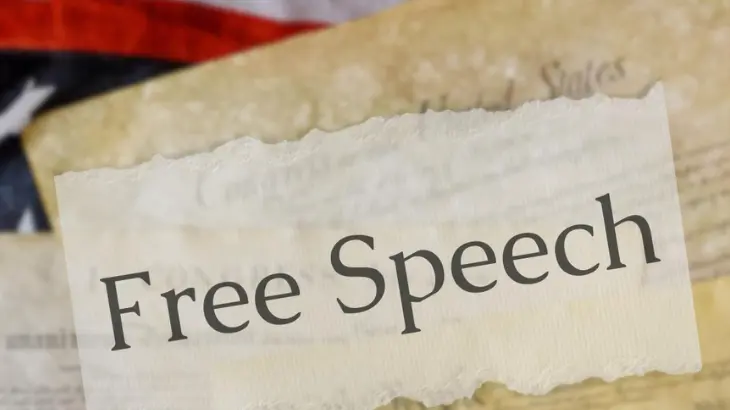Just when you thought attacks on the First Amendment couldn’t get more brazen and dangerous, Springfield lawmakers—Democrats and Republicans alike—prove you wrong.
Under the guise of stopping “doxing,” Illinois lawmakers unanimously passed the “Civil Liabilities for Doxing Act” (HB 2954). But HB 2954 is not just—or even centrally—about doxing. It’s about using the law to undermine First Amendment speech protections.
Doxing is the term commonly understood as publicly identifying or publishing “private information about (someone) especially as a form of punishment or revenge.”
But, as with so many terms in the Orwellian Oceania that America is becoming, “doxing” in the buttinsky hands of Big Brother has now been redefined. Here’s the relevant excerpt from the dangerous new bill:
Provides that an individual engages in the act of doxing when that individual intentionally publishes another person’s personally identifiable information without the consent of the person whose information is published and: (1) the information is published with the intent that it be used to harm … the person whose information is published and with … reckless disregard that the person whose information is published would be reasonably likely to suffer death, bodily injury, or stalking; and (2) the publishing of the information: (i) causes the person whose information is published to suffer significant economic injury or emotional distress [i.e., significant mental suffering, anxiety, or alarm] or to fear serious bodily injury … ; or causes the person whose information is published to suffer a substantial life disruption. (emphasis added)
In the bill, the term “substantial life disruption” “means a material and significant alteration of an individual’s livelihood” and “may include, but is not limited to … or losing time at work or a job.”
Particularly noteworthy is what is missing from this legislation: the word “private.” Conventionally, doxing has referred to the public exposure of private information—not merely personally identifiable information. Remember that as the implications of this bill are further fleshed out.
On a quick read, the legalese of the following excerpt from the bill sounds reasonable, but fully undressing the beast exposes its dark underbelly.
“Personally identifiable information” means any information that can be used to distinguish or trace a person’s identity, such as name, prior legal name, alias, mother’s maiden name, and date or place of birth in combination with any other information that is linked or linkable to a person such as: … email address, social media accounts … education, consumer, or employment information … any other sensitive … information that is linked or linkable to a specific identifiable person, such as gender identity, sexual orientation. (emphasis added)
Rather than deferring to the claims of the bill supporters about the intent of the bill, let’s think about how the language of the bill could (and will) be used.
“Intent to harm”: If this bill becomes law, it will become illegal to post on social media the publicly available name, prior legal name, or “gender identity” of a lawmaker who opposes a bill making the chemical sterilization or sexual mutilation of minors illegal, if the goal of the poster is to “harm” the lawmaker by encouraging voters to oppose his re-election. For most lawmakers, a lost election would constitute “economic injury.”
“Reckless disregard that the person whose information is published would be reasonably likely to suffer death, bodily injury, or stalking”: In this bitterly divided country awash in mentally ill people, doesn’t the expression of pretty much any political opinion carry the potential for assault or stalking to ensue? What criteria then constitutes “reckless disregard”?
The bill does not say that a person whose information—including public information—has been published needs to suffer from “death, bodily injury, or stalking.” Rather, all that is required to trigger a lawsuit is that the person about whom someone published “identifiable information” “would be reasonably likely” to suffer from death, bodily injury, or stalking. Again, what standards or criteria will be used to determine if a post about a person would be “reasonably likely to suffer some awful fate. So, this law convicts a person of a crime for saying publicly available things that someone somewhere may respond to in an act of violence.
“Emotional distress”: Equally deleterious to free speech is the clause about the subjective condition of “emotional distress.” How exactly is that determined, ascertained, or measured? Couldn’t the same experience cause one lawmaker significant anxiety while causing another no anxiety? Shouldn’t laws be based on the objective wrongfulness of an act (e.g., publishing personal information—including publicly available information) rather than the subjective responses of the object (i.e., the person about whom personal information has been published) of the act?
Any political speech, especially on highly controversial issues, carries the potential to inflame the passions of mentally and morally unhinged people. Living in a free society always carries some risks.
Think about the chilling effect this bill will have on free speech. Illinoisans will self-censor their political speech out of fear of a crushing civil lawsuit. Even the ACLU—no longer a friend to the First Amendment—opposed the Civil Liability for Doxing Act. It saw the dangers Illinois lawmakers could not see or were too cowardly to acknowledge.
While an anti-doxing bill would be a good thing, this bill is not. This bill has expanded “doxing” into something unrecognizable—an amorphous blob-like monster capable of gobbling up not only dangerous doxing but speech essential to a healthy democratic society. Doxing—actual doxing—should be illegal. If the leftist sponsors of HB 2954 want to prohibit doxing—as in publishing the home address or social security number of citizens—then Pritzker should give HB 2954 the heave-ho, and lawmakers should write a much narrower bill that balances legitimate privacy rights with constitutionally protected speech rights.
